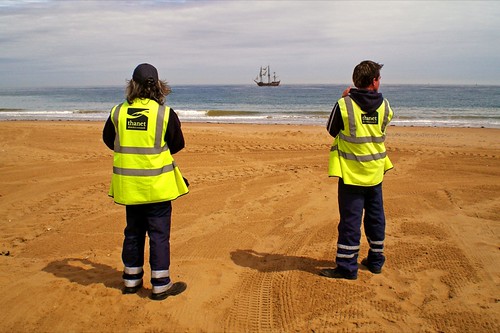The introduction can be found in Part 1: Applying.
For many volunteers, what starts out as a minor interest soon becomes an absorbing hobby, so this post explains how editors settle into their roles once the first confusing steps are behind them ...

(A small resident of Fraser Island, Queensland)
*****************
"Will I be limited to the DMOZ category I applied to?"
Short answer: Only to start with.
A longer answer is found in "Applying for New Categories":
Getting approved to edit a new category is easy if you take the time early on to learn the editing guidelines. We seek to promote editors who have a record of adding quality to the directory. The ODP benefits most from having as many good editors as possible with permissions to edit in broad and diverse areas. If you add quality sites and lots of them, then you will be systematically granted higher and more diverse editing privileges.
*****************
"How much time am I expected to spend editing in ODP/DMOZ?"
Short answer: As much or as little as you feel like.
A longer answer is found in "Becoming an Editor":
There is no time requirement. We appreciate any time you can commit to improving and developing the directory. In order to keep the community thriving, editor accounts will expire after 4 months of inactivity. This allows another editor the chance to take over an area where an inactive editor may have left off.
If your account expires, you can request reinstatement.
*****************
"What if my category is all up to date but I don't have enough edits to apply for another one?"
"What if my category is all up to date but I don't have enough edits to apply for another one?"
Short answer: There is always something to do which will help the directory and add to your experience.
Many new editors assume they must wait for suggestions to arrive from outside the directory, but in fact there are many places where volunteers can look for good sites to add, as explained in "So it's OK to find and add sites myself?".
In some categories, however, there may not be many more sites to add, but the editor can still improve the category by checking the existing links to be sure they work, are correctly listed, and that they have titles and descriptions meeting the current guidelines. All these activities are very worthwhile, and provide valuable experience. Such efforts are always taken into consideration when an editor applies for permission to edit in another category.
Another very useful way of gaining editing experience is to create a brand new category in the editor's own Bookmarks. These editor-created categories can be seen by the public, but are not included in the RDF dump, so they are like categories-in-waiting, and when ready, they can be incorporated into the main directory.
*****************
"What resources are available for ODP/DMOZ editors?"
Short answer: Extensive collections of tools, tips, advice, and forum threads.Over the years, editors have developed tools, written tutorials, and assembled an astonishing amount of information with the aim of making editing easier, more productive and more enjoyable. For example, the DMOZ Documentation Project provides additional examples and explanations to help editors interpret the official guidelines, and the DMOZ Newsletter Archives contain articles on an impressive variety of subjects.
There are also all sorts of useful shortcuts and scripts available to editors, and everyone is encouraged to suggest further improvements to help fellow volunteers. Many editors have extensive IT experience "in Real Life", and there are plenty of opportunities to discuss technical matters pertaining to the directory, and to participate in development projects. In fact the editorial community includes experts from almost every field, and this wide range of knowledgeable people is one of the great attractions of being a volunteer.
*****************
I hope this has been helpful.
Now go and apply!

















